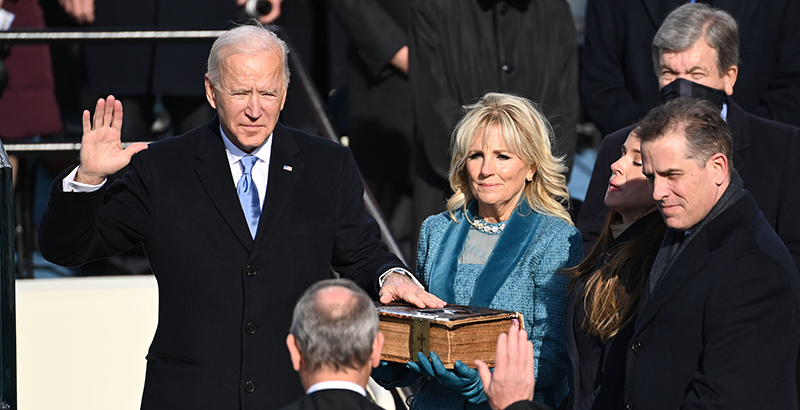On His First Day in White House, Biden Dissolves Trump’s 1776 Commission on U.S. History

On a historic day for American democracy, Joe Biden was sworn in as the nation’s 46th president on the same Capitol steps that were held by rioters only two weeks previously. And in a move that will help to frame U.S. history in classrooms, the new chief executive eliminated the 1776 Commission as one of his first official actions.
Before the inauguration began Wednesday, Biden announced that he would sign a host of executive orders and proclamations aimed at unraveling some of the most prominent work of his predecessor across a range of issues from immigration to environmental protection. The mandates will reverse Trump-era orders banning travel from majority-Muslim countries, authorizing construction on a border wall with Mexico, and withdrawing the United States from the World Health Organization. The new administration also announced it would “restore and fortify protections for Dreamers,” the beneficiaries of the DACA immigration program who were brought illegally to the United States as children.
But education observers will especially note the dissolution of the 1776 Commission, assembled by former President Trump just five months ago in the midst of a furious reelection effort to mobilize voters behind issues of race and American heritage. At the same time he announced the panel’s creation, Trump also ordered federal agencies and contractors to halt diversity training sessions.
The commission’s charge, to promote patriotic U.S. history instruction, was widely seen as a response to the immense success and rapid spread of the 1619 Project, a special issue of the New York Times Magazine that argued the American founding occurred when the first African slaves arrived in colonial Virginia. In a September speech, Trump said that the project “rewrites American history to teach our children that we were founded on the principle of oppression, not freedom,” and complained that a wave of summer riots were triggered by left-wing indoctrination in schools.
While the commission included no experts on American history or K-12 education (one member, Victor Davis Hanson, is an accomplished military historian focusing on the ancient world), it was long on conservative activists and Republican politicians. Its roster was only announced in December, long after Trump’s loss in the Electoral College was sealed, and it held its first meeting on January 5, the day before an assault on the Capitol that many attribute to the president’s own incendiary language about election theft.
In that short span, the group managed to produce a report earlier this week denouncing liberal activism in American schools and alleging that anti-American revisionism “tramples honest scholarship and historical truth.” A link to the report on the White House website now seems to have been rendered inoperative.
The document met with immediate criticism from academic historians, many of whom rejected its claims as shoddy argumentation in service to an unscholarly cause. In an email to The 74, for example, James Grossman, the executive director of the American Historical Association, lampooned its comparison between the early 20th century Progressive reforms and the fascist regime of Mussolini.
“The goal of the report is to discredit government regulation, the accomplishments of those reform movements, and the New Deal and Great Society,” Grossman wrote. “This is part of a political agenda to reverse the legislation and regulatory structures that have emerged over the past century, from the income tax and food and drug regulation to social security, medicare, and civil rights.”
Sam Wineburg, an education professor at Stanford and head of the university’s History Education Group, also dismissed the commission’s work.
“The 1776 document doesn’t unify Americans but divides them further,” Wineburg wrote in an email. “It chooses one side in a historical debate and demonizes the other. The document discloses much more about sloganeering than serious historical study.”
Aside from the report’s contentious claims, a Politico investigation found that a sizable section of the text appears to have been recycled from earlier sources produced by one of its members, the academic Thomas Lindsay.
Jonathan Zimmerman, a historian of education at the University of Pennsylvania, told The 74 that the sometimes vituperative arguments about American ideals and history held a vital place in K-12 classrooms.
“I’m a historian, so I’m always happy when I see Americans discussing and debating the past. But the most important question is what happens — or doesn’t — in our schools, and whether we allow this debate to enter them. We disagree, essentially and enormously, about what we think America was, is, and should be. Let’s not pretend otherwise when the kids are in the room.”
Get stories like these delivered straight to your inbox. Sign up for The 74 Newsletter

;)
